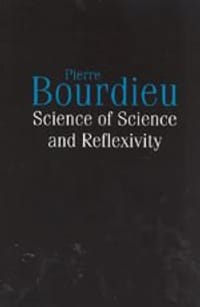Over the last four decades, the French sociologist Pierre Bourdieu produced one of the most imaginative and subtle bodies of social theory of the postwar era. When he died two years ago, he was considered to be a thinker on a par with Foucault, Barthes, and Lacan--a public intellectual as influential to his generation as Sartre was to his.
"Science of Science and Reflexivity" will be welcomed as a companion volume to Bourdieu's now seminal "An Invitation to Reflexive Sociology." In this posthumous work, Bourdieu declares that science is in danger of becoming a handmaiden to biotechnology, medicine, genetic engineering, and military research--that it risks falling under the control of industrial corporations that seek to exploit it for monopolies and profit.
Science thus endangered can become detrimental to mankind. The line between pure and applied science, therefore, must be subjected to intense theoretical scrutiny. Bourdieu's goals in "Science of Science and Reflexivity" are to identify the social conditions in which science develops in order to reclaim its objectivity and to rescue it from relativism and the forces that might exploit it. In the grand tradition of scientific reflections on science, Bourdieu provides a sociological analysis of the discipline as something capable of producing transhistorical truths; he presents an incisive critique of the main currents in the study of science throughout the past half century; and he offers a spirited defense of science against encroaching political and economic forces.
A masterful summation of the principles underlying Bourdieu's oeuvre and a memoir of his own scientific journey, "Science of Science and Reflexivity" is a capstone to one of the most important and prodigious careers in the field of sociology.
皮埃尔·布尔迪厄(1930-2002),法兰西学院院士,著名的哲学家和社会学家,当代法国最具国际性影响的思想者之一。

